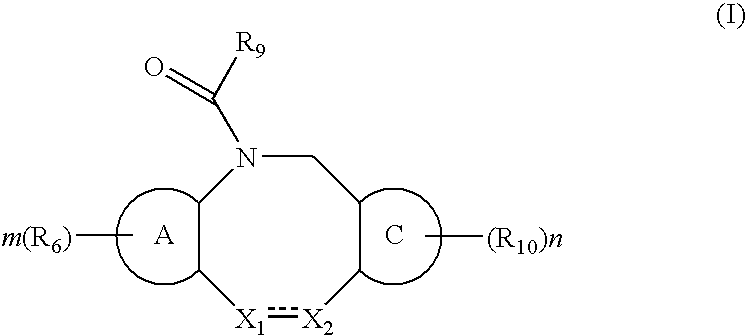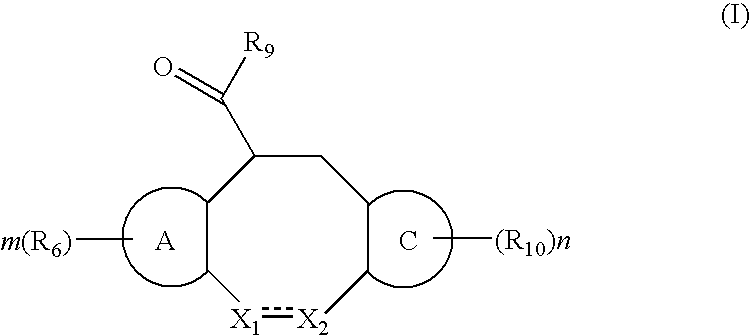Fused heterotricyclic compounds as inhibitors of 17beta-hydroxysteroid dehydrogenase 3
a technology of hydroxysteroid dehydrogenase and heterotricyclic compounds, which is applied in the field of fused heterotricyclic compounds, can solve the problems of affecting the response of patients receiving these treatments, affecting the effect of lhrh analogues on the central nervous system feedback mechanism, and largely restricting responses
- Summary
- Abstract
- Description
- Claims
- Application Information
AI Technical Summary
Problems solved by technology
Method used
Image
Examples
example 1
6-Acetyl-2-chloro-3-fluoro-5,6-dihydro-pyrido[3,2-c][1]benzazocine
[0259]
1A. Preparation of (2,6-dichloro-5-fluoro-pyridin-3-yl)-methanol
[0260]
[0261]To a stirred mixture of 2,6-dichloro-5-fluoro-nicotinic acid (1.0 g, 4.76 mmol) in dry THF (50 mL) under argon was added neat BH3.DMS (1.35 mL, 14.29 mmol) dropwise. The resulting mixture was heated to reflux for 3 hours, cooled to room temperature and quenched by the dropwise addition of water (4 mL). The reaction mixture was concentrated in vacuo. The crude alcohol was diluted with EtOAc, washed with 1N NaOH, 1N HCl, saturated aqueous NaHCO3 solution and brine. The EtOAc layer was dried (MgSO4), filtered and concentrated in vacuo to give 1A (0.93 g, 97%). HPLC Rt=1.79 min (Column: YMC ODS-A 4.6×50 mm (4 min.); Solvent A=10% MeOH, 90% H2O, 0.1% TFA; Solvent B=90% MeOH, 10% H2O, 0.1% TFA); LCMS Found: (M+H)+=210.
1B. Preparation of 3-bromomethyl-2,6-dichloro-5-fluoro-pyridine
[0262]
[0263]To a stirred mixture of alcohol 1A (3.52 g, 17.9 mmo...
example 2
6-Acetyl-3-fluoro-5,6-dihydro-2-(6-methoxy-3-pyridinyl)-pyrido[3,2-c][1]benzazocine
[0272]
2A. Preparation of 2-methoxy-5-(4,4,5,5-tetramethyl-[1,3,2]dioxaborolan-2-yl)-pyridine
[0273]
[0274]To a solution of 5-bromo-2-methoxy-pyridine (1.453 g, 7.73 mmol) in THF (50 mL) at −78° C. under N2 was added n-BuLi (3.4 mL, 2.5 M in hexanes, 8.5 mmol) dropwise. The mixture was stirred at −78° C. for 30 minutes, then 2-isopropoxy-4,4,5,5-tetramethyl-[1,3,2]dioxaborolane (2.4 mL, 11.60 mmol) was added. The reaction mixture was warmed to room temperature for 1 hour, then poured into water and extracted with EtOAc. The combined extracts were washed with water and brine, dried (MgSO4), filtered and concentrated to give 2A (1.221 g, 67.5%) as a colorless oil.
2B. Preparation of 6-Acetyl-3-fluoro-5,6-dihydro-2-(6-methoxy-3-pyridinyl)-pyrido[3,2-c][1]benzazocine
[0275]
[0276]To a solution of 1D (20 mg, 0.066 mmol) in toluene (0.5 mL) and EtOH (0.3 mL) was added a 2M aqueous solution of Na2CO3 (0.3 mL, 0.6 ...
example 3
6-Acetyl-3-fluoro-5,6,11,12-tetrahydro-2-(6-methoxy-3-pyridinyl)-pyrido[3,2-c][1]benzazocine
[0277]
[0278]To a solution of compound 2B (13.6 mg, 0.036 mmol) in MeOH (5 mL) was added 10% Pd / C (3 mg) and the mixture was stirred under a balloon filled with hydrogen for 1 hour. The reaction was filtered through a 0.45 micron filter membrane and concentrated in vacuo to give the title compound (13.6 mg, 100%). HPLC Rt=2.996 min. (Column: YMC ODS-A 4.6×50 mm (4 min.); Solvent A=10% MeOH, 90% H2O, 0.1% TFA; Solvent B=90% MeOH, 10% H2O, 0.1% TFA); LCMS Found: (M+H)+=378.
PUM
| Property | Measurement | Unit |
|---|---|---|
| total volume | aaaaa | aaaaa |
| temperature | aaaaa | aaaaa |
| temperature | aaaaa | aaaaa |
Abstract
Description
Claims
Application Information
 Login to View More
Login to View More - R&D
- Intellectual Property
- Life Sciences
- Materials
- Tech Scout
- Unparalleled Data Quality
- Higher Quality Content
- 60% Fewer Hallucinations
Browse by: Latest US Patents, China's latest patents, Technical Efficacy Thesaurus, Application Domain, Technology Topic, Popular Technical Reports.
© 2025 PatSnap. All rights reserved.Legal|Privacy policy|Modern Slavery Act Transparency Statement|Sitemap|About US| Contact US: help@patsnap.com



